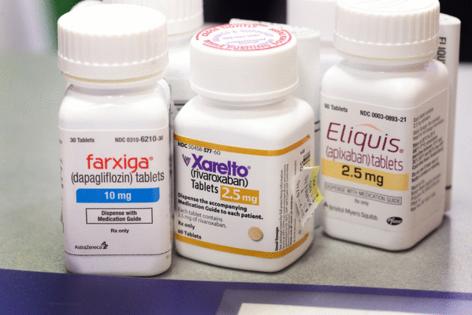Colorado sets first-in-the-nation price ceiling on a prescription drug
Published in News & Features
DENVER — Colorado became the first state in the country Friday to set a maximum price that insurers and patients can pay for a prescription medication — a move that’s likely to face lawsuits.
The state’s Prescription Drug Affordability Board voted to set a maximum price of $600 for 50 milligrams of the arthritis drug Enbrel. Adults typically take that dose weekly, for an annual maximum price of about $31,200. Kids with juvenile arthritis take about half that amount, putting their maximum at roughly $15,600.
As of 2023, insurance companies in Colorado paid an average of about $53,000 a year for each customer using Enbrel. Patients paid about $4,600 annually out of pocket, on average, for the medication.
The drug treats six autoimmune conditions, which involve the immune system attacking joints, skin and other tissues.
The board set its price based on Medicare’s “maximum fair price” of about $584, which is the price the federal Centers for Medicare and Medicaid Services offered as part of price negotiations. By law, CMS has to consider the cost of producing the drug, whether the manufacturer has recouped its investment to develop the medication, how much federal support it received for development and sales data, among other factors.
Last year, the board voted to deem Enbrel “unaffordable,” setting up a months-long process of determining whether it should set a price ceiling, and, if so, how low it should be. The board found the drug’s wholesale price had increased more than 1,500% since it debuted in 1998 and about 40% over the previous five years.
Amgen, which makes Enbrel, sued the state following the board’s decision last year. A federal judge threw out the lawsuit in March, finding the company hadn’t proven it would suffer any harm. Amgen would have to show that the maximum the state will allow insurers to pay is low enough that the wholesalers the drugmaker sells to would need to pay less, Judge Nina Wang ruled. The company has appealed the ruling.
Now that the state has set a price, Amgen also could sue again and argue that the price is too low. The company didn’t say whether it would as of Friday, but stated the board had acted “unlawfully.”
“The Board’s actions will create new access barriers for patients without improving affordability at the pharmacy counter. Amgen remains committed to driving access and affordability solutions for Enbrel patients,” it said in a statement.
Rae Wall, of Denver, told the board Friday that a price ceiling would ease stress on her family and others with chronic illnesses.
“I’m all too familiar with what it is like to struggle to afford lifesaving drugs, having to decide whether or not I spend my grocery budget for the entire month on a refill,” she said.
The Pharmaceutical Research and Manufacturers of America called the upper payment limit a “reckless experiment” that wouldn’t address the drivers of high costs for patients.
“Colorado is risking patient access and jeopardizing the development of new medicines — similar to how Medicare beneficiaries are facing fewer options, more treatment denials and higher costs under the Inflation Reduction Act,” spokesman Reid Porter said. “Mimicking this flawed model will not safeguard patient access and affordability from these abusive practices by middlemen.”
While drug companies have raised concerns about access, no one knows if they would actually cut off sales to one state, particularly if the maximum price is still higher than the cost to produce the medication. That cost information is proprietary, so the public can’t compare it to the upper payment limit.
What an individual pays for medications depends on their insurance plan. Some plans require a flat copay, and people with that type of coverage likely won’t see any change in their out-of-pocket costs. Others require their customers to pay a percentage of the cost of their medication. In those cases, patients could see their costs go down.
_____
©2025 MediaNews Group, Inc. Visit at denverpost.com. Distributed by Tribune Content Agency, LLC.







Comments